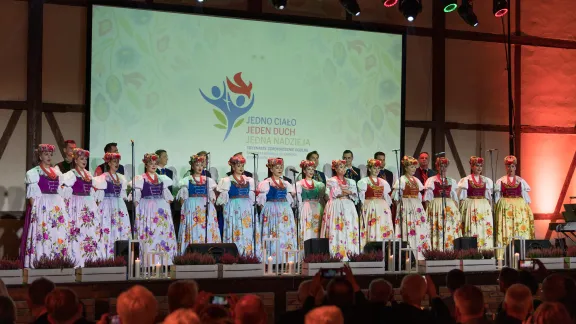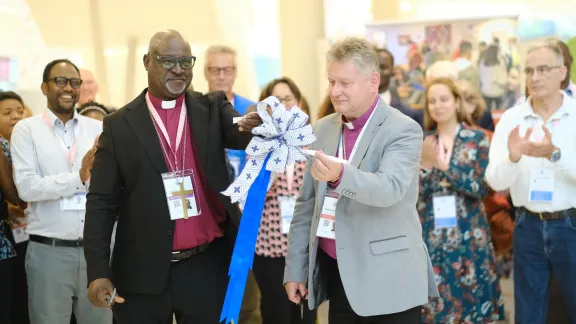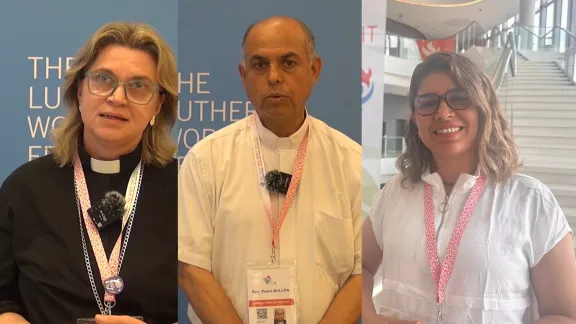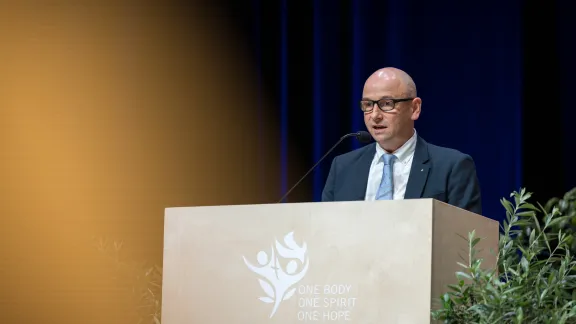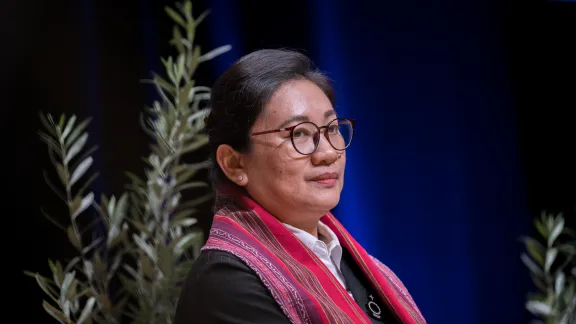14 SEP 2023
Keynote speaker Tomáš Halík says churches must transcend national, religious, cultural boundaries
A new reformation for the 21st century must transcend “the current forms and boundaries of Christianity,” resist simplistic answers to contemporary challenges and contribute to uniting into ‘One Body’ all of humanity, together with all of creation.
On the second day of The Lutheran World Federation (LWF) Thirteenth Assembly in Kraków, Poland, keynote speaker Monsignor Tomáš Halík urged participants from across the global Lutheran communion to be “witnesses to the ongoing resurrection of the Giver of Hope,” by working for a spiritual renewal that goes beyond national, religious, social or cultural boundaries.
A leading Catholic intellectual and author from the Czech Republic, Halík served as advisor to Václav Havel, the first Czech president following the fall of the Berlin wall and the end of the Cold War. A professor of sociology and head of the Religious Studies Department at Prague’s Charles University, he is also the recipient of numerous awards for his work to promote human rights, religious freedom and interfaith dialogue.
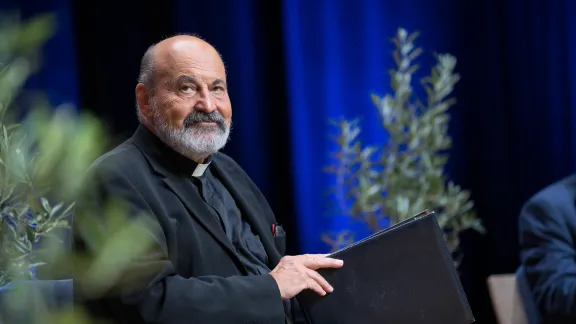
Mons. Prof. Dr Tomáš Halík from Czech Republic delivered the keynote address at the Lutheran World Federation Thirteenth Assembly. Photo: LWF/Albin Hillert
Ecclesia semper reformanda
In his keynote address to delegates attending the 13 to 19 September Assembly, Halík recalled that the church must be “ever reforming, […] especially in times of great change and crisis in our common world.” Reformation is necessary, he said, “where form hinders content, where it inhibits the dynamism of the living core.”
Looking back to the Lutheran and Catholic Reformations of the 16th century, he noted that they “renewed and deepened Christianity, but they also divided it.” The 20th century, he said, “saw the beginning of two great parallel reformations – the global expansion of Pentecostal Christianity and the Second Vatican Council,” marking the Catholic church’s transition from “confessional closedness […] to universal ecumenical openness.”
But the ecumenism of the 21st century, he continued, must go much further than the ecumenism of the previous one. Just as St Paul had the courage to lead “Christianity out of the narrow confines of one of the Jewish sects and into the broader ecumene” during “the first reformation,” Halík said, so Christianity today needs “to transcend existing mental and institutional, confessional, cultural and social boundaries in order to fulfil its universal mission.”
Faith and critical thinking
Reflecting on the “constant struggle between grace and sin, faith and unbelief, waged in every human heart,” he called for an “honest dialogue” between believers and unbelievers living together in pluralistic societies. “Faith and critical thinking need each other,” he insisted, adding that a “mature faith can live with the open questions of the time and resist the temptation of the too-simple answers offered by dangerous contemporary ideologies.”
Turning to questions of religious identity, he noted that “populists, nationalists and religious fundamentalists exploit this fear [of identity loss] for their own power and economic interests.” They exploit it, he said, “in the same way that the fear for the salvation of one’s soul was exploited when indulgences were for sale” in Luther’s days. Comparing Luther to the Catholic mystics of that era, he said, “I am convinced that Luther’s theology of the cross needs to be renewed, rethought and deepened today.”
Part of the new reformation or “new evangelization,” Halík said, “is also a transformation of the way of mission. We cannot approach others as arrogant possessors of truth.” The goal of mission, he reflected, “is not to recruit new church members, to squeeze them into the existing mental and institutional boundaries of our churches but to go beyond” to create a “mutually enriching dialogue” with those of other beliefs and none.
Reconciliation and spiritual discernment
In central and eastern Europe, Halík said, where countries suffered “the dark night of communist persecution,” churches have an important role to play in the process of reconciliation. “Democracy cannot be established and sustained merely by changing political and economic conditions” he warned, but instead requires “a certain moral and spiritual climate.”
Halík also warned that churches that become corrupted by political regimes, deprive themselves of a future. “When the church enters into culture wars with its secular environment, it always comes out of them defeated and deformed.”
The alternative to culture wars, he noted, “is not conformity and cheap accommodation, but a culture of spiritual discernment.” A renewed and newly understood Christian spirituality, he concluded, “can make a significant contribution to the spiritual culture of humanity today, even far beyond the churches.”
Responses from America and Tanzania
Responding to Halík's presentation, Kathryn Lohre, head of ecumenical and inter-religious relations and theological discernment for the Evangelical Lutheran Church in America, said she was encouraged by his emphasis on “Luther’s theology of the cross as the lens for the church’s discernment.” But “are we willing,” she asked, “to touch the wounds” of those suffering from gender-based violence, economic injustice, racism and white supremacy, polarization and ethnonationalism, all exacerbated by the COVID-19 pandemic?
Prof. Halík's words, she said, remind us that "the unbearable intimacy we experience at the foot of the cross is also the crossroads of the entire cosmos," the place where “we can hear, if we listen closely, the groans of God’s good creation, of life emanating from death.”
The second response came from Presiding Bishop Dr Fredrick Onael Shoo, Evangelical Lutheran Church in Tanzania. Speaking as leader of one of the world’s largest Lutheran churches with nearly 8 million members, he said “full churches equally challenge forms of service, like empty churches. We must confess and let go of the irresponsible euphoria and triumphalism accompanying growth,” he said, not claiming credit but rather “asking God for direction and guidance.”
Shoo urged “sister churches in the West to raise a prophetic voice against the atrocities perpetrated by their nations.” Churches must stand clearly against all forms of injustice, like “production and trade in weapons of mass destruction, activities that contribute to environmental degradation and climate change, trade imbalance and all sorts of inhumane policies and actions,” he said.

